Haiti: Training a New Generation of Family Physicians
Posted on Apr 20, 2015

Dr. Fabrice Julcéus knew of one family medicine residency in Haiti, and it was in Cap-Haïtien, a northern city far removed from the bustle of Port-au-Prince. So when he heard the announcement on Radio Caribe that a new residency would soon launch in the less remote St. Marc, he jumped at the chance to apply.
Competition was stiff, but Julcéus earned a spot in the inaugural class alongside five other family medicine residents at Hôpital St. Nicolas, where he cared for patients under the supervision of senior physicians, conducted research, and designed quality improvement projects.
Family medicine was a natural choice for Julcéus, who liked the fact that “you don’t see only a part of the person, you see the whole person—and not only their body. You’re thinking about the psychological and social problems. I love this approach.”
When it launched in 2011, the St. Marc family medicine residency was PIH’s first formal training program for medical specialists in Haiti, made possible through a partnership with sister organization Zanmi Lasante, Haiti’s national medical school, and the Ministry of Health. The first six residents, including Julcéus, finished their three-year program in December; and five are now working part- or full-time as attending physicians or mentors for residents within the PIH/ZL network. Another 16 family medicine residents are now training at Hôpital St. Nicolas, which is operated by the Ministry of Health in partnership with PIH/ZL.
“The vision was really to make a difference in residency training in Haiti” by combining clinical experience with research and quality improvement projects, said Dr. Kerling Israel, whom PIH hired as the first director of the St. Marc family medicine residency program. “My only measure of success is whether I would feel comfortable to go to one of these residents if I am sick. This is the ultimate test.” And she feels she’s well on track to that goal. “I am proud of this first class.”
Jacks-of-all-trades
Choosing family medicine as the first PIH/ZL residency was a wise choice, considering these physicians are the jacks-of-all-trades of the medical world and could help fill the country’s huge health care gap. There are 25 doctors for every 100,000 people in Haiti, compared to the nearly 300 doctors for every 100,000 people in the U.S., according to the World Health Organization.
Family doctors are especially needed in the countryside, where a wide array of illnesses and injuries affect generations of families who live far from hospitals. The physicians are trained to provide primary and preventive care to people of all ages, over their entire lifetimes. They deliver babies and perform C-sections. They treat childhood illnesses. They stitch up wounds. They provide family planning counseling and advice on preventing the spread of HIV. They care for people with diabetes and hypertension. And they are first responders in an emergency or following a traumatic accident.
“We are the frontline doctors,” said Israel, who is now director of medical education across all PIH/ZL facilities—including the six residency programs at University Hospital in Mirebalais. Often family medicine doctors are the only physicians in town. Patients who could benefit from the attention of several specialists rely on them to address all of their ailments. “They can do a lot with less and they can be more efficient.”
By seeing their patients over a long period of time, family medicine doctors develop trusting relationships that allow them to encourage prevention as they treat disease. They also learn about patients’ social conditions—factors such as unemployment, homelessness, or food insecurity—to help them provide better, more compassionate care.
As family physicians we have a responsibility to be change agents.
It’s the type of expertise that’s appreciated in a bustling facility like Hôpital St. Nicolas. On an average day, it’s packed with patients. In a shaded open-air waiting area, women and children sit on rows of benches awaiting family medicine doctors. The labor and delivery staff sees more than 250 deliveries a month—one of the highest among PIH-supported facilities in Haiti. An emergency department can provide beds to 11 patients at once; it used to afford only two.
The residents provide a lot of care and have increased staffing dramatically at the hospital, from four full-time clinicians to 22. They also attract teachers—senior doctors like Israel and other attending physicians from Haiti and the United States—who bring a depth of experience and an extra set of hands to deal with high patient flow.
Research for change
In addition to hands-on clinical experience, residents are required to conduct research and quality improvement projects with the support of supervisors and mentors. In St. Marc, residents have worked on quality-improvement projects such as labeling the wards so that patients can find their way around. They’re also tackling the issue of infant identification. Nurses affix newborns with bracelets that identify them and their mothers, but it doesn’t happen all the time. Residents are investigating the systematic causes of this problem. Are there stock-outs? Is there no clear protocol for placing bracelets? Or is it a lack of training?
Residents also conducted research on teen pregnancy. With approval from the human research board in Port-au-Prince, they reviewed records of all births, miscarriages, and prenatal visits to see if a disproportionate number of pregnancies occurred during the festive Carnival season in the first months of 2014. Julcéus helped investigate the issue and said his group did not produce findings that were statistically significant. If they had, they would have encouraged community outreach and the distribution of condoms in future years’ celebrations.
“As family physicians we have a responsibility to be change agents,” Julcéus said, “to see what doesn’t work and how we can improve it.”
Julcéus will have that opportunity for the foreseeable future: PIH/ZL hired him to work full-time as a research coordinator for the St. Marc and Mirebalais residency programs.

